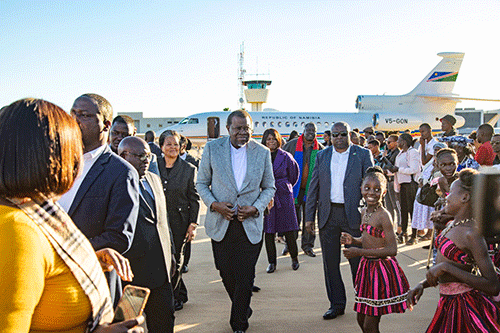Festus Hamalwa
Pricilla Mukokobi
President Hage Geingob has called on parents, caregivers, the private sector, civil society organisations and child and youth-led organisations to play their part in the promotion and protection of children’s rights in all spheres of society.
“Let us take decisive action to invest in digital literacy, and equip children with tools to safely and responsibly navigate the digital world,” he urged in his message to commemorate the Day of the African Child, 16 June.
This year’s theme is ‘The Rights of the Child in the Digital Environment’, recognising the urgent need to safeguard the rights of children as they navigate the opportunities and challenges of the digital age, with calls for reflection and dedication to addressing the myriad challenges facing children.
“As a way to honour the brave actions taken by young people 47 years ago, we recognise how the world has changed with the fourth industrial revolution, which is accelerating artificial intelligence, robotics, the internet of things (IOT) and other technologies in the digital environment,” he noted.
He then recalled the 16 June 1976 Soweto uprising, as it was a turning point in the struggle for freedom in southern Africa. The uprising demonstrated the bravery and determination of young people to end Apartheid, and to open a new chapter for the people of South Africa and the oppressed people of the region.
These wide and dynamic changes in the digital environment have changed and reshaped how children exercise and realise their rights.
Geingob emphasised that children are increasingly exposed to the internet and the virtual environment. Therefore, the effects of the digital environment on children need to be considered in the context of rights under the African Charter and the United Nations Convention on Children’s Rights.
“Children now have access to the vast potential of the Internet, which includes connectivity, education, innovation and entrepreneurship. Alongside these opportunities, evident threats exist, including online child sexual exploitation, cyber-bullying, abuse and cybercrime, necessitating a multi-stakeholder approach to guarantee the promotion and protection of children’s rights,” he stressed.
The Namibian government has made progress with regards to the rights of the child in the digital environment.
“We are further committed to ensuring that all schools have broadband infrastructure by 2030,” he indicated.
He stressed that they have progress in the of Namibian House to advance the rights of children is commendable. However, more still needs to be done.
The President indicated that these include developing legislation and policies which are child-focused in relation to the digital environment, strengthening awareness and capacity at the household level, and creating mechanisms to enforce accountability for children’s online safety.
“Let us reaffirm our commitments to fostering a secure and enabling digital environment where all children can grow, innovate and learn. Together, as part of Agenda 2063, the Africa We Want, we should build a better future for the children of the African House,” he added.
Michael Skini, the United Democratic Front Youth League (UDFYL)’s acting secretary-general this week called for the renewal of the commitment to the struggle for freedom and equality.
“Let us honour the memory of those who fought before us, and let us continue to fight until we achieve the society we all deserve,” he said in a statement.
Skini stressed the importance of engaging and empowering the young generation in political activities.
“The youth are the backbone of any nation, and their involvement in politics is crucial for the development and progress of our country. We must encourage our young leaders to take an active role in shaping the future of our nation. It is essential that we provide them with the necessary resources, guidance and support to enable them to take on leadership roles confidently,” he observed.
University of Namibia (Unam) student Mampi Mushokabanji noted that the Day of the African Child signifies the day on which all African children must demand equality and their right to a higher standard of education. It also serves as a day on which they must understand the importance of such a cause.
“One may argue that the educational system has failed many children, particularly in Namibia over the past two years, as seen by the young children who are repeating grades and living on the streets because they lack the funds to raise their academic standing.
It is a day to honour our parents, forefathers and all the heroes and heroines who battled for our independence. Our freedom, equality and rights to know who we are and what we deserve were won through the blood and labour of others”, she added.
Another youth, Jemima Naomab, told New Era that as an African child, this day makes her heart fill up with pride. She honours the African children before her, who fought for a better world.
“Today, I will keep my fellow Africans in mind as well as the ones who died during the armed struggle. This is good enough reason for us to celebrate in every way we can,” she beamed.
Rivaldo Kavanga, a law student at Unam, said, “simplification of laws to facilitate comprehension for the average Namibian is essential.”
He said it is advisable to encourage alternative dispute resolution (ADR) mechanisms, such as mediation and arbitration, for less complex cases to decrease the number of matters that proceed to trial.
“Furthermore, the adoption of technology by the justice system is crucial to enhance accessibility and facilitate the administration of justice. It is imperative for the government to collaborate closely with key stakeholders, including civil society and law firms, to enhance the efficacy of the justice system by engineering technology driven solutions for the judiciary. An example would be an online case management system that provides instantaneous updates on legal proceedings and reduces paperwork.”
-fhamlwa@nepc.com.na


